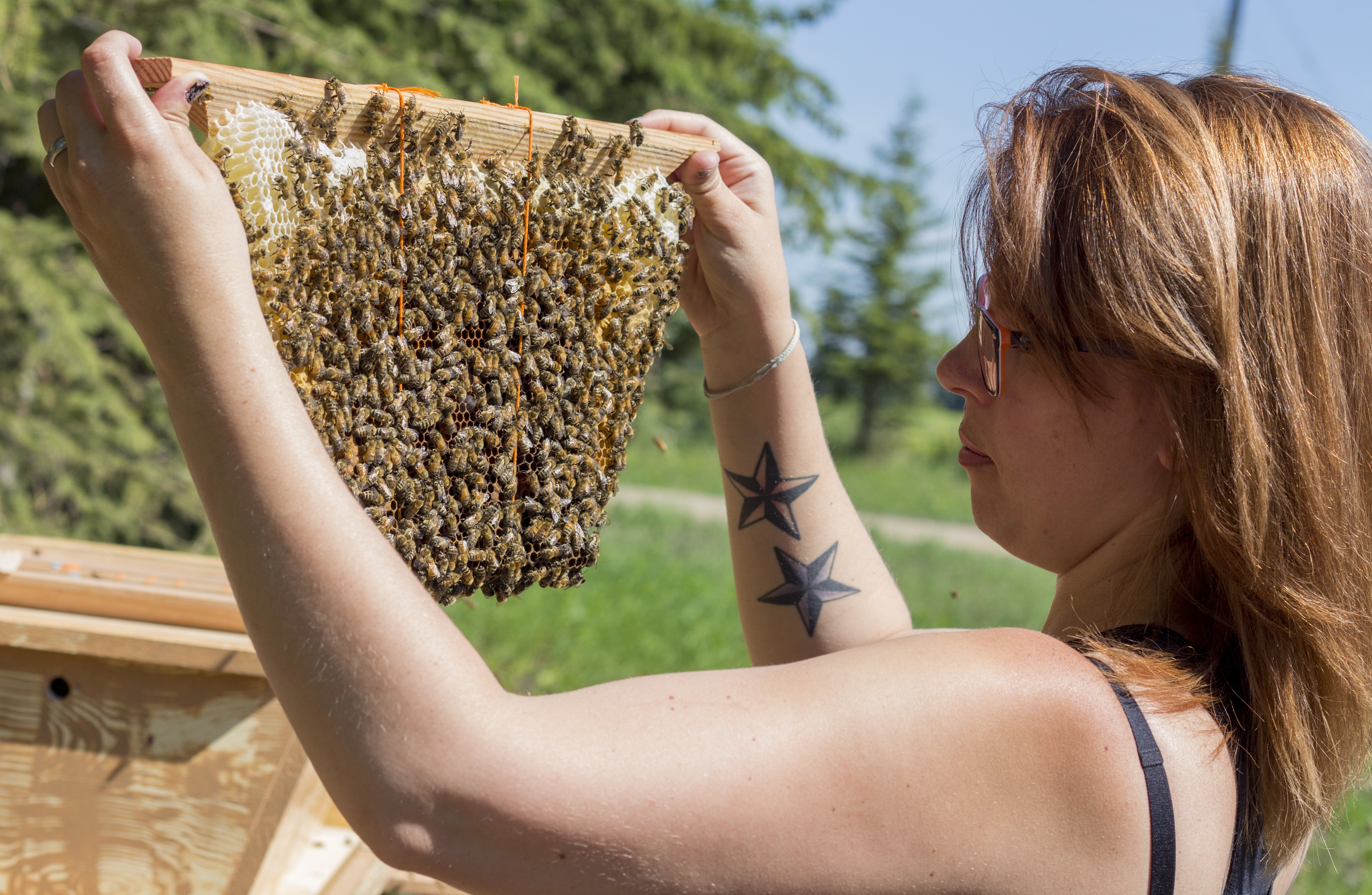Urban beekeeping (or not-so-urban in Red Deer’s case) isn’t an altogether new topic but is quickly gaining momentum across the province as information and resources become more readily available.
The City of Red Deer currently doesn’t allow beekeeping in the City, but hives are permitted outside City limits. A short drive from her urban home takes beekeeper Carol Van de Weghe outside of town to her family’s farm where her hive of approximately 30,000 bees resides.
Van de Weghe said she feels if people were more educated about bees, then the hive-mentality of the City could change to a more positive perspective for the creatures.
“The awareness needs to be there – that you don’t have to be scared of bees. You can call people to get rid of bees safely – we will come to your house, and we will take your bees and we will put them in a little box and take care of them and love them. And then we’ll bring you honey next year,” she said with a laugh.
“The fear is my frustration – that’s why people don’t want bees in town. There is a major misconception about bees. They don’t want to sting you because they know they’ll die. If I were to attack the hive and knock it over, yes I’d probably get stung. I likely won’t if I’m just checking it out and maintaining it.”
Van de Weghe said she’s always had a love for bees and that has only intensified since she took on the role of ‘urban’ beekeeper.
“We’ve come into a society that is technological and this brings you back to nature. People are doing gardens, farmers’ markets are becoming much more popular, there are chickens in the city. With those gardens and things, there are a lot of people who are realizing that it’s not too late to make an impact,” she said.
“A lot of us have young kids and we’re doing it for them and teaching them. I can’t necessarily make the world a better place for my kids by myself, but they’re young enough that they can take in this information and use it when they grow up.”
Before simply wandering into a local forest and grabbing a hive from a tree there’s a lot of education that must take place. Beekeeping varies from region to region, from Canada to Mexico to Italy and back. Van de Weghe follows many international beekeepers by using Instagram and she can track the methods and progressions of hives all over the world.
Several months prior to receiving her first live hive, Van de Weghe took an intensive course in Calgary offered by ABC Bees – Apiaries & Bees for Communities. She also recommended the group’s web site, www.backyardbees.ca, as a great resource for all levels of beekeepers but especially for beginners.
According to the Government of Alberta web site, the Alberta Bee Act regulates beekeeping in Alberta and, “Anyone owning bees or used beekeeping equipment in Alberta or operating bees in Alberta is required to register annually with the Provincial Apiculturist.”
Calgary and Edmonton both have Urban Beekeeping Associations and guidelines for hobby beekeeping within City limits. The course that Van de Weghe took is part of several programs offered by ABC that introduce people into the lifestyle.
“For those who want to become beekeepers – take the course. Take the course by ABC Bees. Read books and educate yourself for your region. Don’t just read random books because climates are different from Canada to Colorado to Mexico. People beekeep all over the world – it’s amazing the different skills people have and the variations in hives and styles of care. You really have to educate yourself on your region,” she stated.
Van de Weghe met another beekeeper from the region, Ron Clowes, at the same course. Both are members of the Red Deer Beekeepers facebook group and are active in the buzzing community.
“Before you go out and just grab the bees, know what you’re doing. Last fall I started looking into this and I got bees this spring. There was an intensive two-day course we took and I really had to start reading because there is a lot to it,” he said.
As well, beekeepers need to pay attention to the diseases that bees can harbour and transfer to neighbouring hives. With a mixture of commercial and hobby beekeepers in the region, a disease can transfer and damage other hives without proper care.
“You’ve got to know how to recognize and handle diseases, so they don’t kill the hive or affect neighbouring hives. You learn things like when to give the bees space so you don’t get swarmed. You can’t just throw bees in a box and take their honey away, because they need the honey in the winter when they’re cold and need food,” said Clowes.
Van de Weghe added honey is a benefit, of course.
“You’re definitely going to get some that you can eat or sell. I like it for my kids. I have three kids and it’s a great way for them to learn. They come out with me sometimes and then tell their friends about bees. It’s fascinating to kind of go back to nature.
“We’re not sure if anyone has something in the works but we’re hoping bees are allowed in the City soon.”
kmendonsa@reddeerexpress.com



